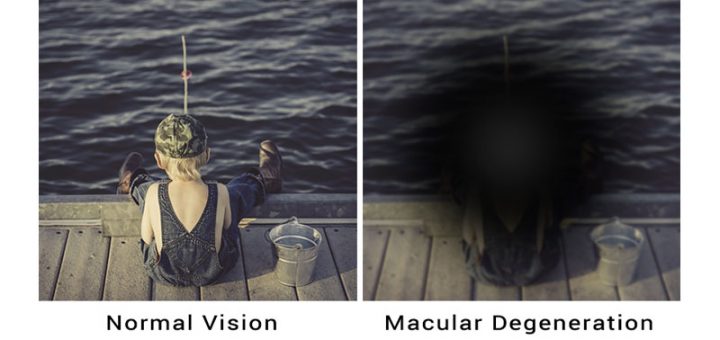
February is age-related macular degeneration and low vision awareness month. Age-related macular degeneration (ARMD) is a disorder of the macula. The macula is the part of your retina where your central and color vision comes from. ARMD is a complex disorder where degenerative protein / lipids (called “drusen”) deposit under the retina. These deposits are seen in early macular degeneration. As the disease progresses, the structural support system of the retina breaks down and can allow abnormal blood vessels to grow or leak fluid and further disrupt the retinal cells. If these blood vessels grow in the macula then you will lose your central vision.
Macular degeneration is the #1 cause of blindness in American seniors aged 65 and up. Two carotenoids, zeaxanthin and lutein, are found inside the retina. It appears that they may help prevent damage caused by free radicals or by light. Two studies found that people who ate vegetables high in these carotenoids had much lower chance of developing ARMD. Also, a large study found that people eating three or more servings of fruit per day had a 36% less chance of getting ARMD in the next 12-18 years than light eaters of fruit (less than 1.5 servings).
These studies confirm what is just common sense: protect the body from free radicals with antioxidants. Antioxidants have been studied extensively and what has been confirmed is that oxidative stress (free radical damage) may be a contributing cause of these diseases.
Oxidative stress is an imbalance between free radicals and antioxidants in your body. Free radicals are oxygen-containing molecules with an uneven number of electrons. The uneven number allows them to easily react with other molecules. Free radicals can cause large chain chemical reactions in your body because they react so easily with other molecules. These reactions are called oxidation. Free radicals can be beneficial or harmful. Antioxidants are molecules that can donate an electron to a free radical without making themselves unstable. This causes the free radical to stabilize and become less reactive.
Common causes of oxidative stress include:
- obesity
- diets high in fat, sugar, and processed foods
- exposure to radiation
- smoking cigarettes or other tobacco products
- alcohol consumption
- certain medications
- pollution
- exposure to pesticides or industrial chemicals
People concerned about developing this vision problem may consider taking both dietary and supplemental antioxidants, such as fruits, vegetables, and supplements like lutein, zeaxanthin, glutathione, and CoQ10.
Lutein and zeaxanthin are known for giving vegetables their green or orange colors. Like other carotenoids, lutein and zeaxanthin are thought to play a role in maintaining eye health and preventing macular degeneration. Foods high in lutein and zeaxanthin include dark leafy greens, peas, summer squash, pumpkin, oranges, brussels sprouts, broccoli, asparagus, lettuce, zucchini, okra, avocado, carrots, and pistachios.
Aside from dietary support, you can also relieve oxidative stress by exercising and getting regular acupuncture treatments. Utilizing all of these tools can help you maintain or even improve you vision. So just like your mom always told you, eating your vegetables is actually good for you and may just help you maintain your eye sight as you age.

